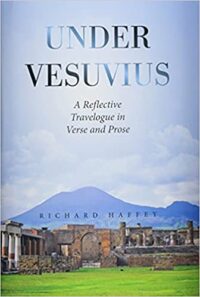Title: Under Vesuvius: A Reflective Travelogue in Verse and Prose
Author: Richard Haffey
Publisher: XlibrisUS
ISBN: 1664169385
Genre: History / Poetry
Pages: 240
Reviewed by: David Allen
Hollywood Book Reviews
Under Vesuvius: A Reflective Travelogue in Verse and Prose is an absorbing and generous recap of the author’s fascinations: Pompei, Herculaneum, Italy, medieval religion, medieval art, travel, science, and the environment. Author Richard Haffey, in the guise of narrating his travels to Italy, encompasses and explains a much larger world. His historical researches, made accessible to the reader through always fluent and articulate prose, bring to life what nature has interred. Namely, the cities of Pompeii and Herculaneum, tragically united as victims of one of the most powerful volcanoes in history–Mount Vesuvius. For those who have stared in wonderment and awe at the bodies and household artifacts preserved by the terrible rain of fire and ashes–on exhibit throughout museums of the world– the poems and prose in this book speculatively answer questions and convincingly portray what it must have been like for those transfixed victims.
The first half of Under Vesuvius contains a series of wonderfully wrought poems by the author. These poems touch upon a spate of subjects, most exceptionally and importantly hell fires (wrought by ‘civilization’) such as poisoning of the environment, world wars, and by allusion, the terrorist bombing of the World Trade Center (Haffey’s novella Windows on the World takes up the second half of the book. ‘Windows on the World’ was a world class restaurant that once occupied the top floor of the doomed twin towers.) Haffey’s conflation of these moral concerns with his own artistry is neither glib nor haphazard. Through the agency of a wise and literate narrative voice, he is able to paint a compelling picture of our world’s woes, framed in the nostalgic yet urgent and appropriate voice of a writer-craftsman. Not only are the poems spontaneous, they are easy to read, even when their content becomes hard to swallow.
The author has a masterful sense of history and he brings his passion for the past and for art history to every page. He brandishes a sword at ecological disaster in the pages of the novella, where medieval monk-artisans labor to put up magnificent church windows depicting the Madonna. Yet these same monks become unlucky victims of their earnest dalliance with lead. Apparently, we have not learned our lesson from those times: environmental toxins like lead (which may be at least in part to blame for the fall of the Roman Empire) continue to poison innocent victims of toxic spills around the planet.
When you read Under Vesuvius, you will not just be informed and edified. You will also experience an overwhelming desire to visit and taste the artistic and gastronomic splendors so ably portrayed in this book.

